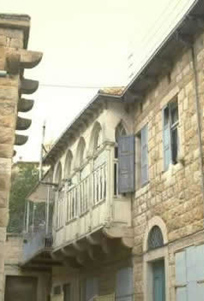 AKKAR, 26 October (IRIN) – Hasna Jawad, 23, considers herself lucky. Even though she lives in the poor and remote village of al-Mjdel in the northern Akkar region of Lebanon, she is able to continue her studies
AKKAR, 26 October (IRIN) – Hasna Jawad, 23, considers herself lucky. Even though she lives in the poor and remote village of al-Mjdel in the northern Akkar region of Lebanon, she is able to continue her studies
"This area has deep-rooted cultural traditions that further pressurise economic needs," noted Abdallah Muhieddine, field coordinator for the UNDP socio-economic development programme in Akkar. "Women don’t go out and don’t mix with men, which limits the work they can do."
Typically, girls leave school at the age of 13 and stay at home for cultural and financial reasons.
"People often can’t afford to send children to school, and if there is a choice, a boy will be sent because he’s considered the breadwinner," Muhieddine pointed out.
On average, it costs 250,000 Lebanese lira – about $170 – for one year of university study.
What’s more, those lucky enough to go from this village must often brave a treacherous, five-kilometre trek to the nearest school.
As a result of these obstacles, illiteracy in the village is estimated at as high as 30 percent, which, Muhieddine said, ultimately affects the local economy. He added that new projects were being planned aimed at promoting education among the women of the village.
But Akkar’s problems, note observers, run deeper than the issue of women’s literacy alone.
POOR LIVING CONDITIONS
Poverty, too, say aid workers, is severe. Average incomes in Akkar are among the lowest in the country, with 16.6 percent of local households living on less than $40 per month, compared to a national average of 4.5 percent. When judged on the basis of income, education and access to healthcare, some 60 percent of Akkar’s quarter million people lives in poverty.
"Akkar is considered one of the poorest areas in Lebanon," said Muhieddine, adding that the region receives little support from local and international institutions. The bulk of national development, he pointed out, has been largely concentrated in the capital Beirut and in the Mount Lebanon area, both before and after the 15-year civil war.
Nestled on the border with Syria, the area appears in stark contrast to Beirut’s luxurious downtown district, where one can pay up to $4 for a cup of coffee.
With local employment almost impossible to find, many locals are tempted to seek jobs in the capital, although this often brings its own set of problems. "If I go to Beirut, transportation will cost money, so I have to think carefully," said Khaled Jawad, who must earn enough to meet the needs of his many children.
POLITICS COULD WORSEN SITUATION
Recent tensions with neighbouring Syria – due to unfolding political developments – have further exacerbated their misery. "We used to go to Syria to buy goods, which are cheaper over there," said Khaled, "but we can’t do that anymore."
To make matters worse, Akkar’s traditional farming industry is currently facing increased competition from imported crops, which threaten to undercut local produce. According to Muhieddine, an absence of clear-cut government policies has done little to help protect the local agricultural sector.
While residents are trying to make a living however they can, they’re having little luck. "We used to pick thyme from nearby fields to sell," said Hasna. "But the government has banned this now."
BETTER POLICIES NEEDED TO COMBAT POVERTY
Joint UN-government projects hope to establish farming cooperatives with the aim of promoting local produce, but much more needs to be done, say observers. "We need to empower the community," Muhieddine said. "We need to help the local government plan for the future."
There are a handful of local NGOs working on providing assistance to Akkar residents via a number of projects, and the UNDP is active in 30 local villages. But even with these programmes in place, Muhieddine argues that the government lacks a master plan to effectively deal with poverty.
"Tackling poverty in Lebanon – especially in Akkar – can only be done through government socio-economic policies, which should then be implemented with the cooperation of international organisations," he said.
"Simply providing poor families with a few services won’t eliminate poverty, the main reasons for which are marginalization and disregard for entire communities."



